Dietetic Diversity: From Mentorship to Practice
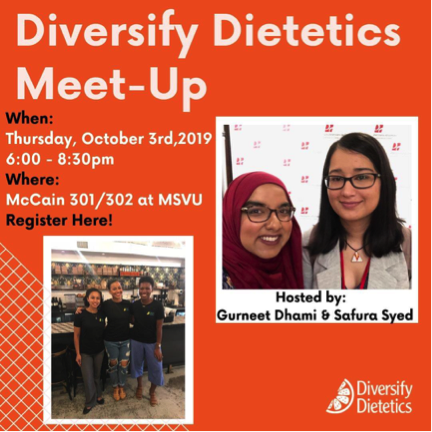 (Safura and Gurneet hosted a DD Meetup in Halifax apart of and funded by Critical Dietetics Conference)
(Safura and Gurneet hosted a DD Meetup in Halifax apart of and funded by Critical Dietetics Conference)
By Gurneet Kaur Dhami and Vincci Tsui
First and foremost, we acknowledge the space we are given by white allies who share their privilege in hearing our worldviews as women of colour. In this blog post, we explore why racial and ethnic diversity is necessary in the field of dietetics, how Canadian dietetics discusses diversity, and the role mentorship can play in supporting up-and-coming talent in the profession. Special thank you to Diversify Dietetics, for providing us with the opportunity to connect us. (Please note that Diversify Dietetics is not affiliated with Dietitians of Canada).
Why Diversity is Necessary in Dietetics
Many Canadians take pride in living in a multicultural country. As a profession where white nutrition undergraduates are almost four times more likely to become a dietitian compared to non-whites,
1 not to mention the fact that approximately 95% of dietitians are female,
2 it begs the questions:
- Are dietitians equipped to effectively serve an increasingly diverse clientele?
- What limitations does the relative lack of diversity within the profession create?
- What is keeping our profession from more closely reflecting the general population?
Over the past few years, discussions concerning
immigration,
reconciliation with Indigenous People,
gender equity and
racism have made headlines. Although these are not food issues, issues off the plate influence a lot of what’s on the plate. With this in mind, it is important for health professionals to acknowledge how they position and embody diversity
3,4,5. Not only does this help us better serve our patients and clients, it also helps to shape the voice of our profession. In fact, one of the reasons why Gurneet is passionate about the topic of diversity is because of her own experiences of
microaggression from colleagues in the field.
Dietitians of Canada has shared their views on diversity and mentorship in past publications of the
Canadian Journal of Dietetic Practice and Research. In response to these pieces
6,7, Gurneet sent a letter to the editor in 2018 to start a discussion on how diversity starts beyond the plate and questions, “who are the professionals holding the plates?”
8 This led her to continue her conversation at the Dietitians of Canada Conference in June 2019 , where she brought up questions on race, gender equity and reconciliation with Indigenous People during the Board of Directors dialogue around diversity and inclusion, along with critical questions over the three-day conference. Additionally, she hosted group conversations (called Braindates) on the challenges on becoming a truly diverse profession. As a researcher, she performed a voluntary survey, asking those who would like to participate to “Please stand up if they do not identify being members of the Black, Indigenous, or People of Colour (BIPOC) and LGBTQ+ community”, which illustrated the overrepresentation of privileged identities in the Canadian dietetic profession.
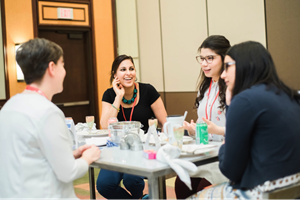 (Gurneet Dhami hosting a Braindate with fellow dietitians Suzanne Daneault, Nadia Pabani and Mays Ibrahim)
(Gurneet Dhami hosting a Braindate with fellow dietitians Suzanne Daneault, Nadia Pabani and Mays Ibrahim)
Gurneet is no stranger to being comfortable with discomfort and challenging the system, and is glad to see this dialogue taking place at events like the
Ninth Critical Dietetics Conference in Halifax, Nova Scotia, which was attended by CEO Nathalie Savoie, and Atlantic regional executive director, Jackie Spiers.
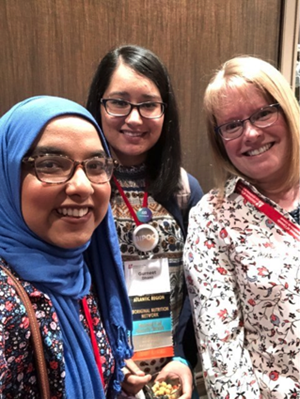 (Mount Students, Safura Syed and Gurneet Dhami with DC Atlantic Representative Jackie Spiers)
(Mount Students, Safura Syed and Gurneet Dhami with DC Atlantic Representative Jackie Spiers)
Mentorship as a Tool to Promote Diversity in Dietetics
Mentoring allows dietitians to develop their skills and areas of expertise, while fostering professional relationships and ensuring the continuity of the profession. The preceptor-intern relationship that all dietitians experience in their path to becoming a dietitian is, in essence, a type of formal mentoring relationship. However, after dietetic internship or practicum, the number of dietitians seeking or supporting mentorship programs remains unknown as there is no data we can reference in Canada. This could be interpreted to mean that mentorship is a potential area for growth within dietetics, as the lack of data suggests that most mentor/mentee relationships within the profession are likely to be informal.
We believe that similar to enhancing one’s counselling skills or transitioning to a specialty area of dietetic practice, dietitians would be able to increase their cultural competence through mentorship.
Our Experience with a Diversity-Oriented Mentoring Relationship
Diversify Dietetics is an American organization founded in 2018 by dietitians Deanna Bellany and Tamara Melton with the mission “to increase diversity in the field of nutrition by empowering students and young professionals from underrepresented minority groups to join the next generation of nutrition experts.” We each became involved with Diversify Dietetics as we both saw a need for increased diversity in the dietetics field through our own personal and professional experiences. We were connected as part of their Mentor Program in September 2018, partly because we are both Canadian.
While we received session guides for our first two meetings, which included some general prompts and exercises to get to know each other better, identify values, and set goals for the mentor-mentee relationship, the program was otherwise very flexible, so that each mentor-mentee pair could get the most out of their relationship. We opted to keep our monthly conversations relatively informal, allowing us to share what was top-of-mind professionally and personally. Not only did our meetings allow us to grow as a dietitian and dietetic intern, respectively, it was also an opportunity to connect with, and feel seen by, someone with a similar background, and dive deeper into issues that are often not talked about in our daily lives.
In addition to the Mentor Program, we continue to be involved in Diversify Dietetics. Vincci was featured in their
RDN Spotlight, while Gurneet, along with her classmate Safura Syed, hosted the first Diversify Dietetics Meetup in Canada, and started a virtual Facebook community for
BIPOC dietetic professionals in Canada and an open group for all those interested in supporting racial/ethnic diversity with a
Diversify Dietetics Canada page.
Where to Go From Here
Mentorship provides an opportunity to reflect on uncomfortable situations and experiences with a trusted person in a safe environment, but the work should really begin with self-reflection—
what am I bringing to the table? Our gender, race, social class, age, ability, religion, sexual orientation, and geographic location, which are all part of our “
social location”, shape how we view and are viewed by the world. A reflective exercise that brings awareness to how your social location informs your everyday is called the
Social Identity Wheel, which Gurneet learned from
Susanne Nyaga, a keynote speaker at the
Social Justice Summit 2019 at Lakehead University. As part of her ongoing advocacy work, Gurneet aims to shed light on how social location informs professional practice in her emerging thesis research.
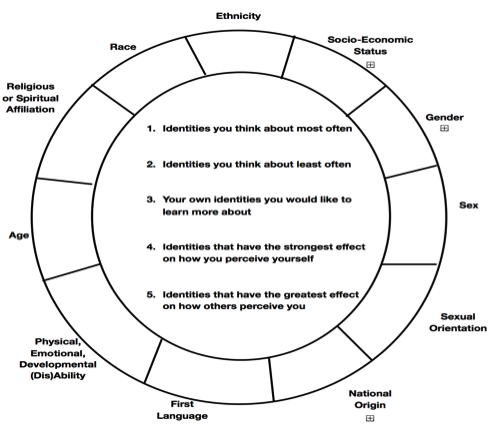 Adapted for use by the Program on Intergroup Relations and the Spectrum Center, University of Michigan. Resource hosted by LSA Inclusive Teaching Initiative, University of Michigan
Adapted for use by the Program on Intergroup Relations and the Spectrum Center, University of Michigan. Resource hosted by LSA Inclusive Teaching Initiative, University of Michigan
As a result of this mentoring relationship and her continued work in advocating for size diversity and body liberation, Vincci has become more comfortable in “taking up space” as a person of colour, though recognizing that she still holds many privileges that allow her to do so. For example, when the latest edition of Canada’s Food Guide was released, she was vocal in pointing out that it misses the mark when it comes to meeting the needs of different ethnic groups, as well as other shortcomings.
The conversation on diversity in dietetics needs to go beyond the diversity within our practice roles. Mentoring relationships can be an opportunity for dietitians to increase their cultural competency, along with other practice-related skills. Whether it’s through formal mentoring relationships like Diversify Dietetics or informal networks, we feel that it is important for dietitians, interns and students alike to seek out these opportunities, but more importantly, have
spaces that invite conversation that will help the profession become more inclusive and diverse.
Note from the Board of Directors: Your Board of Directors is committed to diversity and inclusion because these issues have far reaching implications for the overall value and sustainability of our profession. We applaud the work and messages by Gurneet Dhami and Vincci Tsui, authors of today’s blog post. In fact, the Board integrated the following into DC’s upcoming priorities for the organization: “Members experience a sense of belonging to a mutually supportive, engaged, inclusive and diverse professional community.” Let’s work together on cultural change!
References
- Riediger ND, Kingson O, Mudryj A, Farquhar KL, Spence KA, Vagianos K, et al. Diversity and Equity in Dietetics and Undergraduate Nutrition Education in Manitoba. Can J Diet Prac Res, 2019;80(1):44-46.
- Dietitians of Canada. The Dietitian Workforce in Canada: Meta-Analysis Report – March 2011. Toronto: Dietitians of Canada; 2011.
- Beaudry, M., Lilley, S., & Aucoin-Larade, L. A conceptual framework for dietetics. Can J Diet Prac Res,1991 52(2), 77-79.
- Fox, M. Global Practices, Cultural Competency, and Dietetics. J Acad Nutr Diet, 2015;115(3), 516-520.
- Hwalla, N., & Koleilat, M. Dietetic practice: the past, present and future. East Mediterr Health J.,2004; 10(6), 716-730.
- Chuey P. A Team of Diverse, Dynamic Dietitians. Can J Diet Prac Res, 2011;72(3):106.
- Royall D. Food Unites Dietitians in Diverse Roles. Can J Diet Prac Res, 2019;80(1):1.
- Dhami, G. (2018). RE: Inclusive Dietetic Practice (Letter to the Editor). Can J Diet Prac Res, 79(4), 156.
 Gurneet Kaur Dhami, BASc.
Gurneet is a South Asian woman brought up by a Sikh family in blue collar household from Toronto, ON. She is currently an MSc Applied Human Nutrition student at Mount Saint Vincent University. She is an alum for Ryerson’s Nutrition and Food program and moved to Halifax, Nova Scotia to pursue thesis work that aims to explore the narratives from racialized dietetic professionals and their socialization into the professional. She is an avid writer as she reflects on conference and professional experiences in blogs from the realm of food security, social justice and social innovation.
Gurneet Kaur Dhami, BASc.
Gurneet is a South Asian woman brought up by a Sikh family in blue collar household from Toronto, ON. She is currently an MSc Applied Human Nutrition student at Mount Saint Vincent University. She is an alum for Ryerson’s Nutrition and Food program and moved to Halifax, Nova Scotia to pursue thesis work that aims to explore the narratives from racialized dietetic professionals and their socialization into the professional. She is an avid writer as she reflects on conference and professional experiences in blogs from the realm of food security, social justice and social innovation.
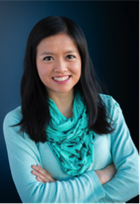
Vincci Tsui, RD
Vincci Tsui is a former bariatric dietitian turned Certified Intuitive Eating Counselor, yoga teacher, and Health At Every Size® advocate. She is the author of The Mindful Eating Workbook: Simple Practices for Nurturing a Positive Relationship with Food, and serves as the community and content manager for the popular Food Psych® podcast. Vincci recently founded the Weight-Inclusive Dietitians in Canada community, an online continuing-education platform for dietitians to learn about weight-inclusive care while connecting with like-minded dietitians across the country.
Back to Practice Blog